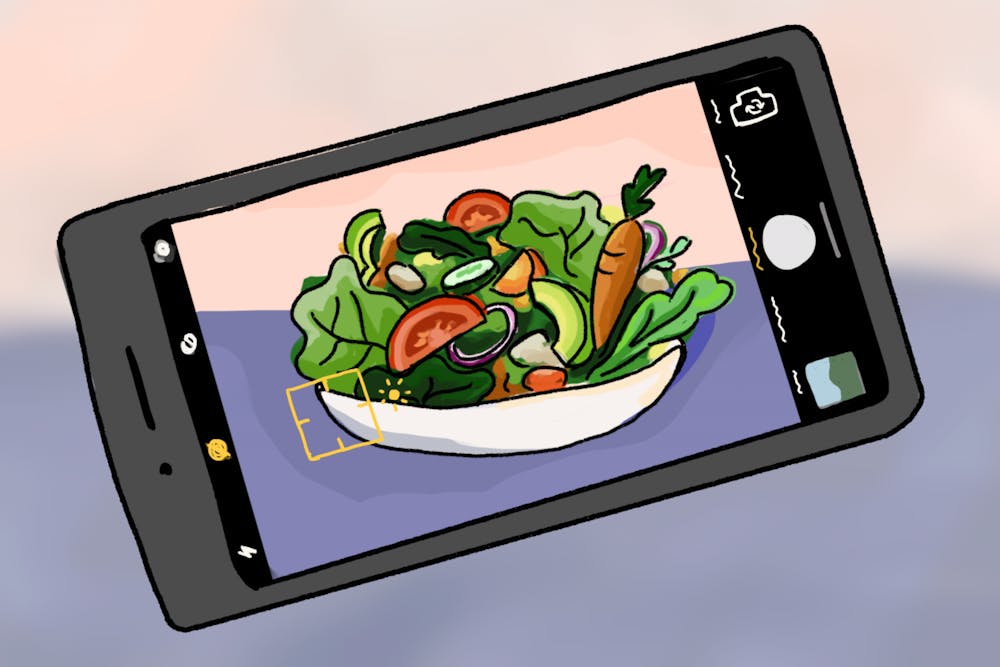Remember when TikTok was all dance videos? Neither do I. Now my “For You Page” is a mix of cat videos, fashion inspiration, Harry Potter memes, and weird animations. I think I even saw a cow give birth the other day. A recurring trend I’ve seen quite a lot of recently, though, is the “What I Eat in a Day.” In these 60–second clips, people show their audience members all of the meals and snacks they ate in a given day. I’ve seen them range from “weight loss” to “unhealthy” (as often specified by the captions), and, while they may be somewhat entertaining, they can be more impactful than you might think.
The term “health” has become so misconstrued over time to refer to physical traits rather than nutrition and nourishment. Diet culture has left a lasting impression on many people’s relationships with food, even in the most subtle ways. This promotion of toxic food habits is more talked about now than ever before, especially thanks to the “What I Eat in a Day” trend on TikTok. However, there are two sides to the story.
Each and every “What I Eat in a Day” video falls into one of two categories: helpful or harmful. Before discussing this, though, it’s important to disclaim that none of these videos, good or bad, demonstrate what you should or should not be eating. If you want to lose weight or change the way you eat, the advice to follow is that of your doctor or a registered dietitian, not that of a 60–second TikTok video. You should also be listening to your own body and its hunger cues—you’re the only one who knows when you’re hungry or full!
So, what makes a “What I Eat in a Day” video harmful? Any video without a disclaimer, when placed on the “For You Page” of any impressionable person, may translate to “What You Should Eat in a Day.” It may seem like common sense that every person requires different amounts and types of food to sustain themselves, but to a person with a distorted view of nutrition and caloric intake, this type of video may seem like a strict set of rules to follow. These videos become even more dangerous when the creator demonstrates severe restriction in their eating habits. In the video below, registered dietitian Abbey Sharp breaks down some of these incredibly unsustainable diets.
These harmful videos can be especially triggering when you take TikTok’s algorithm into account: One doesn’t have to go searching for a “What I Eat in a Day” in order for it to pop up on the “For You Page.” If a person with a disordered eating past comes across a restrictive, low–calorie “What I Eat in a Day,” they may very well end up relapsing. In order to avoid as much harm as possible, anyone creating such videos should think first about their purpose. Why are you choosing to share this on TikTok? What do your eating habits promote? How will others feel when they see your video?
A helpful “What I Eat in a Day” focuses more on the mentality behind eating than the actual food itself. The bubbly Brittani Lancaster, a popular TikToker, supplements her videos with words of love and encouragement. She posted her first “What I Eat in a Day” back in March with the caption “It’s all about listening to your body & balance! 3 years of eating disorder recovery.”
Since then, she has uploaded a “What I Eat in a Day” daily, as well as additional body–positive content. Lancaster promotes intuitive eating: honoring your cravings, making healthy choices, listening to your hunger cues, and not feeling guilty for eating. Yes, she shows her daily meals and snacks (which are usually balanced and always delicious), but she makes the takeaway from her videos a lesson in how to repair your relationship with food.
Eating is about fueling our bodies to give us strength and energy. This is the message that needs to be spread; it’s the ultimate key to loving your body and treating it well. It is unfortunate that social media often plays a huge role in how we see ourselves, but if we take advantage and use platforms like TikTok to promote healthy minds and bodies, we can begin to reverse the effects that years of toxic diet culture have implemented within us.







